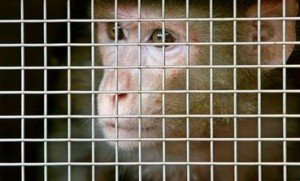A new report published today recommends that scientific research on monkeys should continue in the UK – subject to rigorous safeguards.
 The report was commissioned by several major funding bodies to assess the need for, and quality of, primate research in the UK. The project was headed by Prof Sir Patrick Bateson.
The report was commissioned by several major funding bodies to assess the need for, and quality of, primate research in the UK. The project was headed by Prof Sir Patrick Bateson.
The overall finding was that much of the research considered was outstanding in its quality, in its care for the animals used and in its likely benefits to medicine. Such work should be supported. However in a few cases, the justification for the work was judged inadequate or insufficient.
The report reviews research on non-human primates starting over a ten-year period from 1996. It emphasises that each new application for funding of research should be subject to careful review of the scientific value of the research, the probability of medical or social benefit, the availability of alternative approaches and the likelihood and extent of animal suffering.
The full report is available here.
It should be noted that, unlike the UK, New Zealand ethics committees cannot authorise research on non-human members of the family Hominid, being the gorilla, chimpanzee, bonobo or orangutan. Under exceptional circumstances, the Director General of the Ministry of Forestry and Agriculture can approve such applications.
Our colleagues at the UK Science Media Centre collected the following commentary from primate research experts:
Lord Willis, Chair of the Association of Medical Research Charities (AMRC), said:
“AMRC value this review of research involving non-human primates over the past decade. This measured review is evidence of the thorough consideration and concern of the research community over the use of animals to support research into medical conditions. We will work with the scientific community to act on the recommendations to ensure research using non-human primates maintains the highest standards of welfare and takes place only where entirely necessary and with a clear medical and scientific benefit.
“AMRC only support the use of animals in research where it is absolutely necessary and no suitable alternative methods are available. We support work to develop alternatives and minimise the need to use animals. Non-human primates are only used when the research cannot be conducted using other animal models or with human participants. In some cases animal models, and the use of non-human primates, are the only way we can do research that will relieve suffering and bring hope to patients with life threatening or debilitating conditions.”
Professor Roger Lemon, neuroscientist working at the Institute of Neurology, UCL, said:
“As an active researcher using non-human primates (NHPs), I welcome this report, which shows that although the funding agencies spend only a tiny fraction of their research budget on primate research, the systematic analysis presented in the Bateson report shows that this investment has resulted in good quality research in neuroscience that was highly cited, and having scientific impact.
“Much of the neuroscience research surveyed in the Report is of a fundamental nature; but experience shows that these advances in the laboratory will ultimately lead to improvements in our treatment of some of the most challenging clinical problems facing our society: neurodegenerative disease and psychiatric disorders.
“I fully endorse the Report’s view that we need to further optimise the benefit from each and every primate used, because these monkeys are an incredibly sensitive and valuable animal model. NHP researchers in the UK are themselves constantly trying to refine their techniques and improve the welfare of monkeys in their care, and these efforts have received a considerable boost from the establishment of the UK National Centre for the 3Rs.
“Primate research in the UK is under threat because of its high financial cost, which in turn is partly due to the special security measures needed to protect this important work. I am particularly glad that the Report highlights the need to address this cost issue ‘as a matter of urgency’ and also its stress on the need to encourage training in this area of research. Both recommendations will help the UK to remain competitive in this critical area of medical research.”
Professor John Stein, Emeritus Professor of Neuroscience, University of Oxford, said:
“I am very glad that the report has confirmed the importance and usefulness of experiments using non-human primates. A small number of these remain essential because the monkey’s visual system, manual, postural and locomotor control and immune system are so similar to human’s. That such a very small number of NHP experiments were deemed to have been unsuccessful demonstrates how rigorously the Home Office ensures that all other possibilities have been considered for obtaining the desired information, and how well the great majority of experiments have been designed. Not all experiments can be successful however. If we could guarantee that, we wouldn’t need to do the experiments in the first place.”